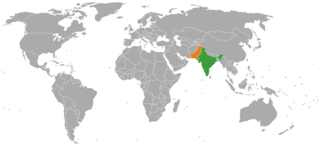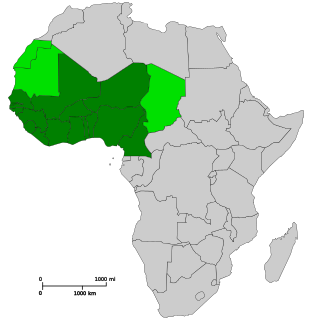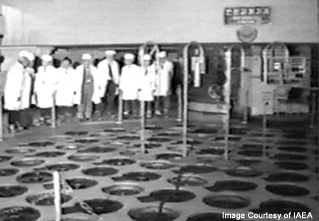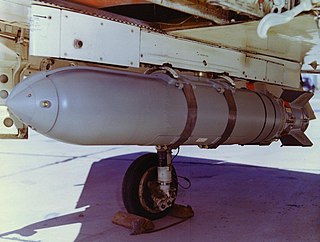
United Nations Security Council Resolution 687, adopted on 3 April 1991, after reaffirming resolutions 660, 661, 662, 664, 665, 666, 667, 669, 670, 674, 677, 678 and 686 (1991), the Council set the terms, in a comprehensive resolution, with which Iraq was to comply after losing the Gulf War. Resolution 687 was passed by 12 votes to one against (Cuba) with two abstentions from Ecuador and Yemen after a very extended meeting. Iraq accepted the provisions of the resolution on 6 April 1991.

United Nations Security Council Resolution 1695, adopted unanimously on July 15, 2006, after recalling resolutions 825 (1993) and 1540 (2004) concerning North Korea and the non-proliferation of weapons of mass destruction respectively, the Council banned the selling of material that would further the ability of the Democratic People's Republic of Korea to bolster its ballistic missiles programme.

United Nations Security Council Resolution 1718 was adopted unanimously by the United Nations Security Council on October 14, 2006. The resolution, passed under Chapter VII, Article 41, of the UN Charter, imposes a series of economic and commercial sanctions on the Democratic People's Republic of Korea in the aftermath of that nation's claimed nuclear test of October 9, 2006.

The UN Office for Disarmament Affairs (UNODA) is an Office of the United Nations Secretariat established in January 1998 as the Department for Disarmament Affairs, part of United Nations Secretary-General Kofi Annan's plan to reform the UN as presented in his report to the General Assembly in July 1997.

United Nations Security Council resolution 1540 was adopted unanimously on 28 April 2004 regarding the non-proliferation of weapons of mass destruction. The resolution establishes the obligations under Chapter VII of the United Nations Charter for all Member States to develop and enforce appropriate legal and regulatory measures against the proliferation of chemical, biological, radiological, and nuclear weapons and their means of delivery, in particular, to prevent the spread of weapons of mass destruction to non-state actors.

United Nations Security Council resolution 1172, adopted unanimously on 6 June 1998, after hearing of nuclear tests conducted by India and Pakistan in May 1998, the Council condemned the tests and demanded that both countries refrain from engaging in further tests.

United Nations Security Council Resolution 1916, adopted unanimously on March 19, 2010, after recalling resolutions 733 (1992), 1519 (2003), 1558 (2004), 1587 (2004), 1630 (2005), 1676 (2006), 1724 (2006), 1744 (2007), 1766 (2007), 1772 (2007), 1801 (2008), 1811 (2008), 1844 (2008), 1853 (2008), 1862 (2009), 1894 (2009) and 1907 (2009), the Council extended the term of the Monitoring Group for 12 months and expanded its mandate to include the monitoring of the arms embargo on Eritrea in addition to Somalia.

United Nations Security Council resolution 984, adopted unanimously on 11 April 1995, the Council gave assurances to non-nuclear weapon states that were parties to the Nuclear Non-Proliferation Treaty (NPT) against the threat of nuclear proliferation.

United Nations Security Council Resolution 1928, adopted unanimously on June 7, 2010, after recalling resolutions 825 (1993), 1540 (2004), 1695 (2006), 1718 (2006), 1874 (2009) and 1887 (2009) on the topics of North Korea and nuclear weapons, the Council extended the mandate of a panel of experts monitoring sanctions against the country until June 12, 2011.

United Nations Security Council Resolution 1929, adopted on 9 June 2010, after recalling resolutions 1696 (2006), 1737 (2006), 1747 (2007), 1803 (2008), 1835 (2008) and 1887 (2009) concerning the topics of Iran and non-proliferation, the Council noted that Iran had failed to comply with previous Security Council resolutions concerning its nuclear program and imposed further sanctions on the country.

United Nations Security Council resolution 1467, adopted unanimously on 18 March 2003, after expressing concern at the situation in West Africa, the Council adopted a declaration regarding the proliferation of weapons and mercenary activities in West Africa.
United Nations Security Council resolution 1535, adopted unanimously on 26 March 2004, after reaffirming resolutions 1373 (2001), 1377 (2001) and 1456 (2003), the Council restructured the Counter-Terrorism Committee to enhance the implementation of anti-terrorism measures.

United Nations Security Council Resolution 1957, adopted unanimously on 15 December 2010, after recognising positive developments in Iraq since the adoption of 661 (1990), the Council lifted sanctions relating to weapons of mass destruction, long-range ballistic missiles, and the acquisition of nuclear weapons.

United Nations Security Council Resolution 1984, adopted on June 9, 2011, after recalling resolutions 1696 (2006), 1737 (2006), 1747 (2007), 1803 (2008), 1835 (2008), 1887 (2009) and 1929 (2010) concerning Iran and non-proliferation, the Council extended the mandate of an expert panel monitoring sanctions against the country over its nuclear program for a period of one year.

United Nations Security Council Resolution 1985, adopted unanimously on June 10, 2011, after recalling resolutions 825 (1993), 1540 (2004), 1695 (2006), 1718 (2006), 1874 (2009), 1887 (2009), 1928 (2010) on the topics of North Korea and nuclear weapons, the Council extended the mandate of an expert panel monitoring sanctions against the country until June 12, 2012.

United Nations Security Council Resolution 1673, adopted unanimously on April 27, 2006, after considering a report from the Committee of the Security Council established in Resolution 1540 (2004) concerning non-proliferation, the Council extended the mandate of the Committee monitoring the resolution's implementation concerning weapons of mass destruction and their means of delivery until April 27, 2008.
United Nations Security Council Resolution 1762 was adopted on 29 June 2007.
United Nations Security Council Resolution 1810 was unanimously adopted on 25 April 2008.
Project Alpha is an academic research project working to counter nuclear proliferation-related trade. It was founded in 2011 with funding from the British Government and is housed in the Centre for Science and Security Studies at King's College London. Its primary mission is to publish independent research findings on illicit trade activities and to support the private and the public sectors with the implementation of international trade controls in order to deter the proliferation of nuclear weapons.

The UN Security Council Sanctions Committee on North Korea is a subsidiary body established in 2006 by the UN Security Council's resolution 1718 in response to North Korea's first nuclear test and its other nuclear proliferation efforts.
















